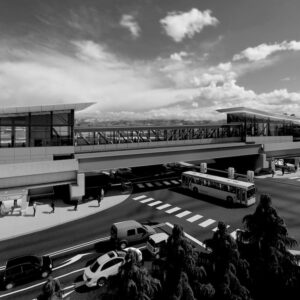Community and business leaders are expressing dismay for the King of Prussia area as Southeastern Pennsylvania Transportation Authority (SEPTA) this month blamed rising costs and inflation, as well as the Biden administration, for pausing the plan to extend a high-speed line to the Philadelphia suburb.
SEPTA said last week it would cease construction on the project for the time being due to a lack of funding. The cost of the four-mile extension from Norristown—called KOP Rail by developers— had risen to more than $3 billion.
Ryan Rosenbaum, executive director of the Montgomery County Chamber of Commerce, told the Delaware Valley Journal: “The impact of not having the KOP Rail line will be felt in this area in the years to come.
“Here is why. This region is booming with hotels, retailers, restaurants, and a major casino. Many of the employees of these businesses live in other regions of the Greater Philadelphia area and find it difficult (from a transportation perspective) to come to King of Prussia to work.
“Many are without cars and rely heavily on SEPTA,” Rosenbaum continued. “The problem of finding quality employees to come here to work is an issue that’s been percolating here for a while. The suspension of this project can have ramifications in retaining quality employees, who spend a considerable time commuting to King of Prussia.
“The impact runs much deeper. This project could have been a gateway to reducing congestion on major highway arteries in this township. Workers could have depended on reliable train service, which would have reduced the carbon footprint in the region.
“This also has an adverse effect as the rail system could have been utilized by residents in Upper Merion who may have used the rail to go into the city to dine, see theater and or get to the airport,” Rosenbaum added.
Eric Goldstein, president and CEO of the King of Prussia Business District, is also disappointed—and concerned.
“This is a huge loss for this region, and the federal dollars that could have come here will now go to one of our national competitors,” Goldstein said in a statement.
“I am disappointed that we are not going to help the thousands of Philadelphia and Delaware County residents stuck on congestion-delayed buses trying to get to their jobs in King of Prussia in a timely fashion. My biggest regret is that they are now forced to continue riding buses with only a 66 percent on-time performance.
“I am disappointed that Upper Merion will not have a way to get thousands of cars off the roads as 60,000-plus employees and even more shoppers, diners, and visitors come here daily,” Goldstein added.
John Golden, a spokesman for SEPTA, said in a statement that the project “is not recommended for federal New Starts funding in Fiscal Year 2024, and SEPTA will use resources allocated for KOP Rail to bolster essential infrastructure work.”
A major factor preventing KOP Rail from advancing is the lack of flexibility in the transit agency’s capital budget.
Federal Transit Administration officials have expressed reservations about SEPTA’s ability to fund its project share, including any cost overruns. SEPTA’s capital budget is constrained compared to peer transit agencies that have more state and local funding.
“SEPTA’s capital budget has been underfunded for decades. This has left the Authority with significantly fewer resources than peer agencies to pursue system expansion while also addressing critical infrastructure needs,” said SEPTA General Manager and CEO Leslie Richards.
“With the funding we have currently, SEPTA must prioritize essential infrastructure work and safety and security improvements to maximize the reliability and effectiveness of our aging system.”
From August 2020 to August 2022, officials said the KOP Rail project estimate increased from $2.08 billion to $2.6 billion.
Congresswoman Madeleine Dean (D-Montgomery), who voted for and praised the $1.2 trillion Biden administration Infrastructure Act, did not respond when DVJournal asked why funding for the King of Prussia Rail was not included in that federal measure. According to a White House fact sheet, that bill included $39 billion for mass transit.
State Rep. Andy Briggs (D-King of Prussia) also declined to comment.
“The news is disappointing, but I’m hopeful that the hard work is not for naught,” Rosenbaum told DVJournal. “Perhaps this vision can rekindle in the future.”
Please follow DVJournal on social media: Twitter@DVJournal or Facebook.com/DelawareValleyJournal

